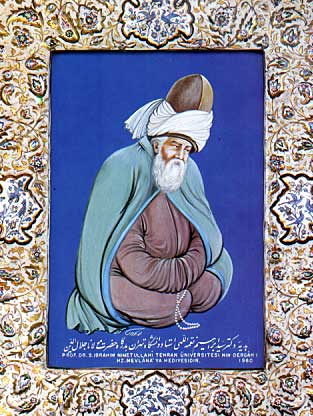Mevlana Rumi ‘s birthday to be celebrated in Turkey, Iran

Celaddiin-i Rumi is a 13th century Muslim saint and Anatolian mystic with Persian origins known globally for his exquisite poems and words of wisdom, which have been translated into many languages.
Rumi, born on 30 th September 1207, as he is known in the west, is the best selling poet in USA. The United Nations declared 2007 The Year of Rumi, his 800 birthday and celebrations were held world wide. Rumi or Jalaluddin Mohammad as it goes in Iran, the Sufi poet and Mystic was born in Balkh in former Persia present day Afghanistan. He was the son of Baha’u-‘d-Din, who decided to leave Balkh when Mevlana was about 5. The family traveled to Baghdad, to Mecca on pilgrimage, and to Damascus. They eventually settled at Konya (in present day Turkey). In Konya, Mevlana lived the rest of his life. Konya was a great city open for everyone from different religions and thus had a great role in Mevlana’s personal development.
Mevlana and Sufism
Mevlana was a Muslim, but Sufism was his doctrine, which advocates unlimited tolerance, positive reasoning, goodness, charity and awareness od felf awareness through love. To him all religions were more or less truth. Mevlana looked with the same eye on Muslim, Jew and Christian alike. His peaceful and tolerant teachings have appealed to men of all sects and creeds. In 1958, Pope John XXIII wrote a special message saying: “In the name of the Catholic World, I bow with respect before the memory of Rumi.”
Mevlana’s Work
Mevlana died on 17 December 1273 and was laid to rest beside his father in Konya, in present day Turkey. A splendid shrine, the Mevlana Moseleum was erected over their remains, which is now a museum and place of pilgrimage. Every year on that day, at this magnificient 13th century mausoleum we celebrate Seb-i Arus, his ‘Wedding Day’, together with thousands of people from all around the world.
Mevlana & Whirling Derwishes
Mevlana’s major work is Masnavi-e Manavi (Spiritual Couplets). other books: Diwan-e Shams-e Tabriz-i (The Works of Shams of Tabriz – named in honor of Mevlana’s great friend and inspiration), Fihi Ma Fih (In It What’s in It), Majalis-i Sab’a (Seven Sessions), Robai’yat (the couplets), Makateb (the written piece letters)
[adrotate banner=”33″]


Magnificent beat ! I wish to apprentice whilst you amend your web site, how can i subscribe for a blog web site? The account aided me a acceptable deal. I were tiny bit acquainted of this your broadcast offered vibrant clear idea
Mevlana was born in Balkh-Afghanistan his father his familly was an Afghan he was an Afghan but he has nothing in Afghanistan like a School like a Moseum etr. but thanks turkia that he has evreything in Turkia his name is allways alife.i like him allways